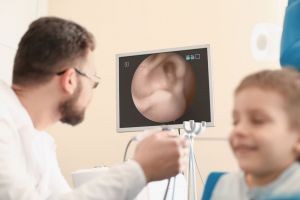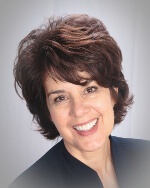|
www.HealthyHearing.com |
Four causes of temporary hearing loss in kids
Contributed by Debbie Clason, staff writer, Healthy Hearing Key points:
There’s no doubt about it–parenting is not for the faint of heart. One moment your child is hearing perfectly well and the next? He may be fussy and feverish or complaining that things “sound funny” or clogged. Is it time to call the doctor? Maybe. Here are four of the most common causes of temporary hearing loss in children and ear pain and what you should do if they occur. 1. Middle ear infection
causes of hearing loss in kids. According to the National Institute on Deafness and Other Communication Disorders (NIDCD), five of every six children will have at least one middle ear infection by their third birthday. In fact, ear infections are the most common reason parents take their child to the doctor. The good news is, although they can cause your child a lot of discomfort and hearing loss, ear infections usually clear up on their own without any permanent damage to the hearing, although you should always check with your child's doctor. The most common type of ear infection among children is known as acute otitis media (AOM). This occurs when parts of the middle ear become infected and swollen, trapping fluid behind the eardrum. If your child isn’t old enough to tell you they have an earache, look for these symptoms:
What to do about ear infectionsEar infections are usually caused by bacteria from your child’s cold or sore throat that spread to the middle ear. Some methods that can help your child feel more comfortable include:
Your child may need antibiotics. Check in with your child's doctor to see if they recommend treatment. 2. Swimmer's earIf your child has been swimming recently—especially in non-chlorinated water like a lake or pond—it could be swimmer's ear, a type of infection of the ear canal. It can be quite painful and cause muffled hearing. Children who are prone to getting water stuck in their ears may be more likely to develop swimmer's ear. What do about swimmer's ear
3. Impacted earwaxIt’s hard to believe, but earwax serves a purpose. Not only does its waterproof properties help protect the eardrum and ear canal, it also traps dirt, dust and other particles from entering the ear and irritating the eardrum. Here’s another shocker: the body produces just as much earwax as it needs and knows how to get rid of the excess. It’s OK to use a washcloth to gently clean your child’s ear, but please don’t use cotton swabs or any other object to reach any accumulation you might see in the ear canal. These objects can actually push the earwax further into the ear canal and/or puncture the eardrum, causing more harm than good. What to doIf your child complains he can’t hear well or sound is muffled, he may have an excess of earwax that is blocking the ear canal and preventing him from hearing well. In that case, make an appointment with your family doctor. If the earwax is causing pain or interfering with your child’s hearing, she will be able to remove the excess safely in just a few minutes. If it’s not earwax, it might be another type of obstruction. 4. Other obstructionsBy their very nature, kids are curious. As infants, they stick everything they can find into their mouths. When they get a little older, they start discovering other body orifices to explore and may curiously try to see if something fits where it doesn’t belong–like in their ears. Common objects include pebbles, beans and small candies. Although it’s very normal for them to explore in this manner, it can lead to swelling, infection and temporary hearing loss. How can you tell if your child has something stuck in their ear? You may not be able to immediately. If the object is lodged far enough into the ear canal, you may not notice until your child complains of an earache or that things sound “funny.” You may possibly see some discharge from the ear, although not always. What to doIf you suspect your child has something stuck in his ear:
To keep your child’s hearing in tip-top shape
If you are concerned about your child's hearing ability, please find a hearing care professional in your area who specializes in pediatric hearing testing. Hearing testing can be done at any age and many children find it quite fun! Debbie Clason, staff writer, Healthy Hearing
|
Featured clinics near me
Earzlink Hearing Care - Reynoldsburg
7668 Slate Ridge Blvd
Reynoldsburg, OH 43068

Find a clinic
We have more hearing clinic reviews than any other site!


 Debbie Clason holds a master's degree from Indiana University. Her impressive client list includes financial institutions, real estate developers, physicians, pharmacists and nonprofit organizations.
Debbie Clason holds a master's degree from Indiana University. Her impressive client list includes financial institutions, real estate developers, physicians, pharmacists and nonprofit organizations.